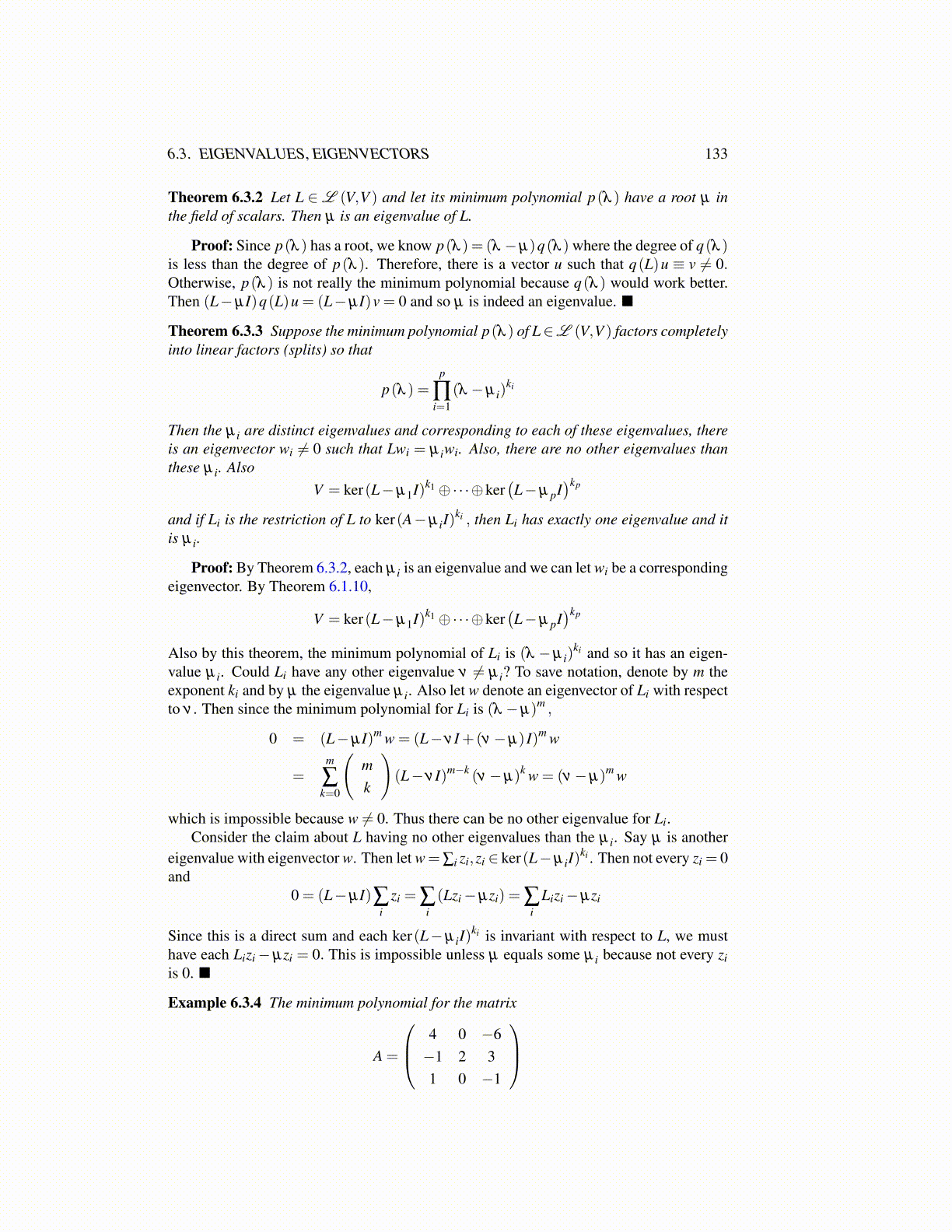
6.3. EIGENVALUES, EIGENVECTORS 133
Theorem 6.3.2 Let L ∈L (V,V ) and let its minimum polynomial p(λ ) have a root µ inthe field of scalars. Then µ is an eigenvalue of L.
Proof: Since p(λ ) has a root, we know p(λ ) = (λ −µ)q(λ ) where the degree of q(λ )is less than the degree of p(λ ). Therefore, there is a vector u such that q(L)u ≡ v ̸= 0.Otherwise, p(λ ) is not really the minimum polynomial because q(λ ) would work better.Then (L−µI)q(L)u = (L−µI)v = 0 and so µ is indeed an eigenvalue. ■
Theorem 6.3.3 Suppose the minimum polynomial p(λ ) of L∈L (V,V ) factors completelyinto linear factors (splits) so that
p(λ ) =p
∏i=1
(λ −µ i)ki
Then the µ i are distinct eigenvalues and corresponding to each of these eigenvalues, thereis an eigenvector wi ̸= 0 such that Lwi = µ iwi. Also, there are no other eigenvalues thanthese µ i. Also
V = ker(L−µ1I)k1 ⊕·· ·⊕ker(L−µ pI
)kp
and if Li is the restriction of L to ker(A−µ iI)ki , then Li has exactly one eigenvalue and it
is µ i.
Proof: By Theorem 6.3.2, each µ i is an eigenvalue and we can let wi be a correspondingeigenvector. By Theorem 6.1.10,
V = ker(L−µ1I)k1 ⊕·· ·⊕ker(L−µ pI
)kp
Also by this theorem, the minimum polynomial of Li is (λ −µ i)ki and so it has an eigen-
value µ i. Could Li have any other eigenvalue ν ̸= µ i? To save notation, denote by m theexponent ki and by µ the eigenvalue µ i. Also let w denote an eigenvector of Li with respectto ν . Then since the minimum polynomial for Li is (λ −µ)m ,
0 = (L−µI)m w = (L−νI +(ν−µ) I)m w
=m
∑k=0
(mk
)(L−νI)m−k (ν−µ)k w = (ν−µ)m w
which is impossible because w ̸= 0. Thus there can be no other eigenvalue for Li.Consider the claim about L having no other eigenvalues than the µ i. Say µ is another
eigenvalue with eigenvector w. Then let w=∑i zi,zi ∈ ker(L−µ iI)ki . Then not every zi = 0
and0 = (L−µI)∑
izi = ∑
i(Lzi−µzi) = ∑
iLizi−µzi
Since this is a direct sum and each ker(L−µ iI)ki is invariant with respect to L, we must
have each Lizi−µzi = 0. This is impossible unless µ equals some µ i because not every ziis 0. ■
Example 6.3.4 The minimum polynomial for the matrix
A =
4 0 −6−1 2 31 0 −1